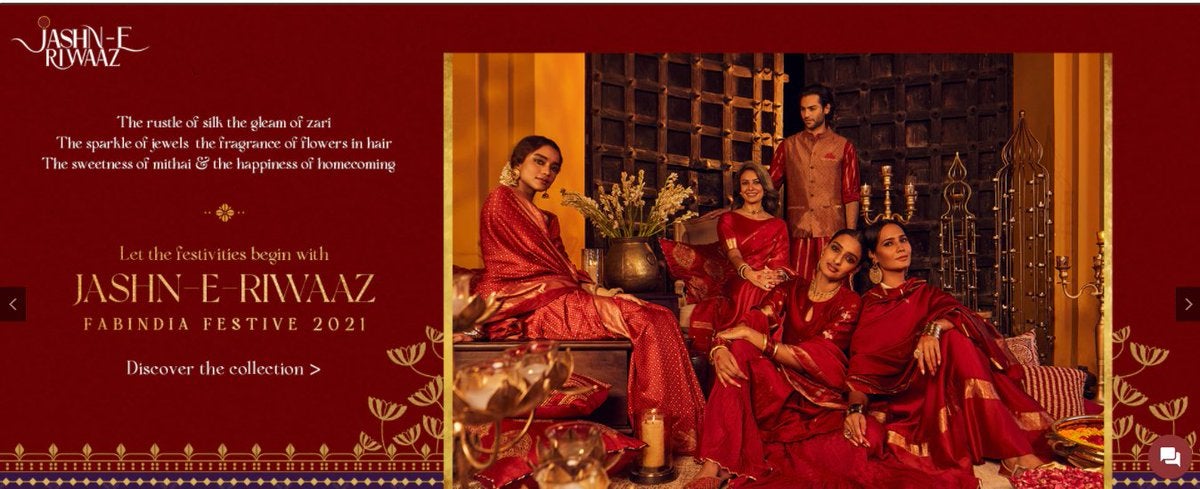Right wing groups force Indian clothing brand to pull advert
The brand was accused of ‘abrahamisation of Hindu festivals’ for using an Urdu phrase

Your support helps us to tell the story
From reproductive rights to climate change to Big Tech, The Independent is on the ground when the story is developing. Whether it's investigating the financials of Elon Musk's pro-Trump PAC or producing our latest documentary, 'The A Word', which shines a light on the American women fighting for reproductive rights, we know how important it is to parse out the facts from the messaging.
At such a critical moment in US history, we need reporters on the ground. Your donation allows us to keep sending journalists to speak to both sides of the story.
The Independent is trusted by Americans across the entire political spectrum. And unlike many other quality news outlets, we choose not to lock Americans out of our reporting and analysis with paywalls. We believe quality journalism should be available to everyone, paid for by those who can afford it.
Your support makes all the difference.Popular clothing brand Fabindia, known for its traditional Indian attires, was forced to remove a tweet about a new festive collection after political leaders from India’s ruling right-wing party objected to the use of an Urdu phrase to describe a Hindu festival.
The brand called a new clothing line it advertised for Diwali -- one of the biggest festivals celebrated by Hindus -- “Jashn-e-Riwaaz,” which translates to celebration of customs or traditions.
However, social media users accused the brand of appropriating the festival and hurting Hindu religious sentiments. Some even called for a boycott of the brand.
Lawmaker from India's ruling Bharatiya Janata Party (BJP) Tejasvi Surya in a tweet accused the brand of "abrahamisation of Hindu festivals."
"Deepavali is not Jash-e-Riwaaz" ... depicting models without traditional Hindu attires, must be called out. And brands like Fabindia must face economic costs for such deliberate misadventures," he added.
Another legislator from India's northern state of Uttarakhand RajKumar wrote: "Seems like Fab India has done this deliberately to hurt Hindu Sentiment". He also shared a post asking, "What is Jashn-e-Riwaaz? some Pakistani ritual on the occasion of Eid".
The cry for the boycott was supported by several prominent Indians with allegiance to the BJP. By Monday evening “BoycottFabIndia” and “Urdu” were among the top 20 topics on Twitter.
The company in a statement to the Indian Express newspaper said: "Our current capsule of products under the name Jashn-e-Riwaaz is a celebration of Indian traditions. The phrase means that, literally. The capsule is not our Diwali Collection of products. Our Diwali collection is called ‘Jhilmil si Diwali’ is yet to be launched".
Urdu is one of the 22 official languages recognised by the government of India and is spoken by millions, mostly in the northern belt of the country. It is among the 14 other languages printed on the Indian currency notes.
Since the rise of Hindu nationalism in India following the victory of prime minister Narendra Modi in 2014, Hindu groups have largely associated Urdu with the Muslim community. Ironically, many words used in modern-day Hindi, the language preferred by the right-wing, is derived from Persian. The word "Hindi" itself finds roots in Persian.
Urdu originated in the northern part of India around the 12th century during the Delhi Sultanate rule and was influenced by a set of Indo-Iranian languages such as Persian, Turkish and Pashto.
Earlier in October, jewellery brand Tanishq was forced to withdraw an advertisement featuring a baby shower for an inter-faith couple following backlash from Hindu groups.
Pro-right supporters called the commercial an alleged attempt to promote “love jihad” -- a term used by some radical Hindu outfits to allege a conspiracy by Muslim men to marry women from other religions with the intention to convert them to Islam.
Join our commenting forum
Join thought-provoking conversations, follow other Independent readers and see their replies
Comments